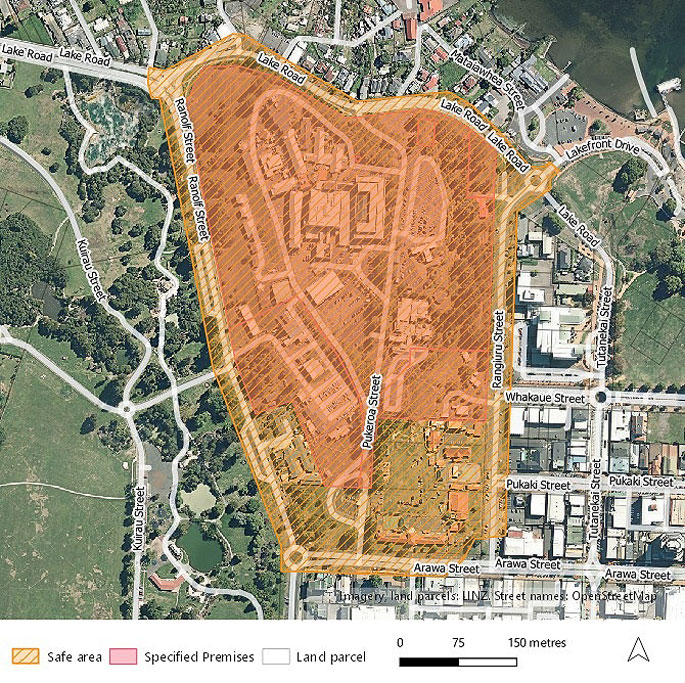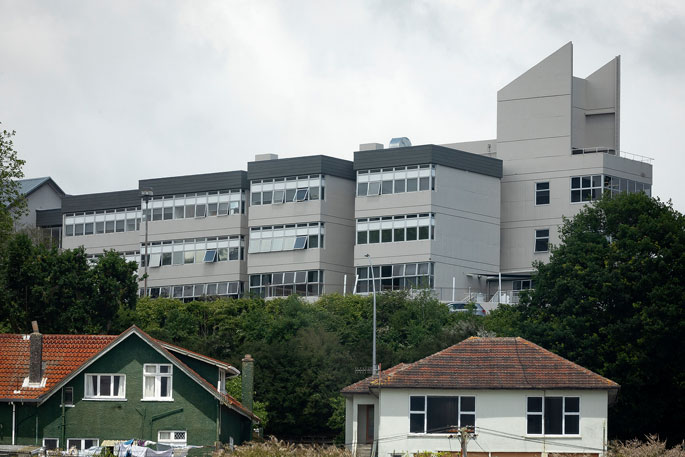Anti-abortion protesters face a $1000 fine if they demonstrate in a newly designated “safe area” outside Rotorua Hospital.
It comes after patients say they feel upset, distressed and judged having to pass protesters to reach the clinic.
Te Whatu Ora Lakes applied to the Government in November for an area surrounding the hospital campus to be classed as a safe area under the Contraception, Sterilisation and Abortion Act 1977.
On Thursday last week, it became the 11th abortion service provider in New Zealand to create a safe zone.
The area is bordered by Arawa St, Ranolf St, Lake Rd and Rangiuru St and includes the road corridors and Pukeroa St, which ran through the middle.
Te Whatu Ora Lakes operations group director Alan Wilson says patients previously needed to drive or walk past anti-abortion protesters on their way to and from Te Aka Tauawhi Tangata Women’s Clinic.
“Our clinic staff regularly receive feedback from patients saying the protesters’ presence has upset and distressed them.
“They also felt judged by seeing protesters and their placards at the entrances of Rotorua Hospital, immediately prior to attending the clinic.”
A Ministry of Health spokesman says a safe area can be up to 150 metres around a place where abortion services are provided.
Banned behaviours in that area include trying to dissuade people from accessing the service and photographing or videoing them in a way that would cause emotional distress.
“There is a history of protest activity and other behaviours outside known abortion providers around the country that would be prohibited within safe areas,” says the spokesman.
He says patients and staff say the protests impact their feelings of safety. Staff considered increasing security measures, while patients feel “further stigmatised”.
Anyone convicted of banned behaviour in a safe area can be fined up to $1000.
He says police take a case-by-case approach in assessing whether the behaviour potentially breached rules.
“A graduated police response is focused on education, engagement, encouragement, prior to enforcement.”
He says safe areas are designed to protect the safety and wellbeing of people accessing and providing abortion services and to respect their privacy and dignity.
Under the Code of Health and Disability Consumers’ Rights, people accessing a health service have the right to be treated with respect and to freedom from discrimination, coercion, harassment and exploitation.
The Ministry of Health website describes how providers, such as Te Whatu Ora Lakes, are expected to support enforcement through preventative measures such as installing signage and training staff on banned behaviours and de-escalation procedures.
Wilson says most of the protesters are peaceful, but their presence is still distressing.
“Our security staff are aware of the implementation of the safe area and are well trained in de-escalating incidents.
”We are not intending to have signage as it is not required.”
No incidents have been reported since the safe area came into effect.
 A map showing the area around Rotorua Hospital where anti-abortion protests are banned. Source: MOH.
A map showing the area around Rotorua Hospital where anti-abortion protests are banned. Source: MOH.
Abortion is legal in New Zealand, and reforms in 2020 decriminalised it and made it easier to access. The legislation passed in Parliament by a narrow margin of 68 votes to 51.
Rotorua resident Ryan Gray heard about the safe area and wrote to the Rotorua Daily Post supporting it.
He says being free from what in his view is discrimination and feeling safe accessing health services should be basic rights for all.
In his view: “I don’t expect to be hassled seeking help for illness, and neither should people who have made the arduous decision to end their pregnancy.”
He says, in his opinion, there has been a “small but persistent group” of anti-abortion protesters who “believe they have the right to tell others what they should do with their bodies”.
Patients of no other health service face this level of what he believes is “intimidation”.
He believes protesters may feel they are supporting a worthy cause, but would have “no idea about the circumstances of the person seeking an abortion”.
“And no matter the circumstances, people have the right to seek health services, and do not deserve judgement for doing so.”
Right To Life New Zealand spokesperson Ken Orr says he has written extensively on the safe area legislation, which he describes as “contentious”.
Orr claims the legislation seeks to address a problem that doesn't exist.
Orr says, in his opinion: "The purpose of this legislation is to protect the abortion industry, which does not want women to change their minds.
He believes the Government also seeks to suppress dissent against abortion, which is promoted as a health service.
Banned behaviour
Activities prohibited in safe areas, such as that around Rotorua Hospital, include:
-Blocking entrances to premises or preventing people from entering or leaving;
-Photographing or videoing someone in a way that is likely to cause emotional distress to someone accessing or providing abortion-related services;
-Approaching a person to provide information about abortion services (unless part of the provision of services);
-Approaching a person to attempt to dissuade them from accessing these services;
-Providing anti-abortion pamphlets or similar materials;
-Protesting about matters relating to the provision of abortion services.
Source: Ministry of Health.
Public Interest Journalism funded through NZ On Air.




0 comments
Leave a Comment
You must be logged in to make a comment.